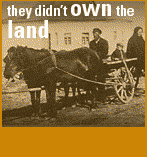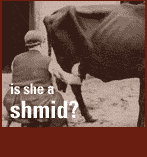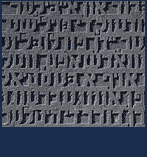

Isaac Bashevis Singer (1904-1991) was born in Leoncin, Poland and grew up mostly in Warsaw, but he spent three years of his childhood in the family shtetl of Bilgoraj. Recipient of a traditional religious education, he nevertheless developed a love for secular Yiddish culture and, inspired by his brother and other Yiddish writers, he set out to chronicle the world he saw around him: Hasidim, school rooms, village characters, peasants, rabbis, the day-to-day activities of shtetl life, and its folklore.
First publishing stories in 1925, he made his real debut in 1932 with the acclaimed novel, Der Sotn in Goray (Satan in Goray), which was based on the epidemic of false messianism that enveloped Jewish Europe in the 17th century. Like many writers of the age, I.B. Singer worked under several pen names, including "Y. Warszawski" for serious journalistic endeavors and "D. Segal" for lighter stories..
In 1935, he followed his brother to New York City and also took a job with the Forverts, where he wrote articles, short stories, and, very often, serialized novels. Gradually he developed a reputation as a master storyteller whose realistic novels detailed the simple truths behind every-day Jewish life. He went on to write many other celebrated works, such as Di Familye Mushkat (The Family Moskat ) in 1950, a novel about Jewish life in pre-World War II Warsaw, and The Slaves (1962), a historical romance set during the Chmielnicki massacres in 17th> century Poland. Literary critic Dan Miron observes:
"This witty, skeptical Jew, devoid of all pathos and full of humor, who combined sarcasm with tragedy and fatalism, traveled across the American and international literary scene like the 'last of his kind'…Isaac Bashevis was the last great emissary of the kingdom of Yiddish to the world of Western culture in the second half of the twentieth century."













